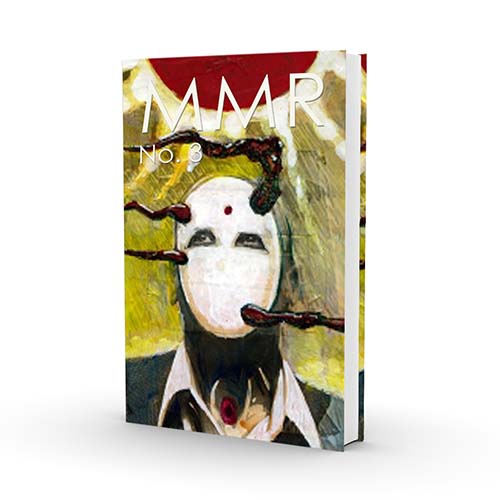Eckleburg No. 3
Cover: Leviathan’s Red Son | MARK REEP
“The most exciting and adventurous and gutsiest new magazine I’ve seen in years.” Stephen Dixon“Refreshing… edgy… classic… compelling.” Flavorwire“Progressive….” NewPages“Eye-grabbing… fun… bold… inviting… exemplary.” SabotageListed among Wigleaf’s Top 50 (Very) Short Fictions 2012“Eclectic selection of work from both emerging and established writers….” The Washington Post“Literary Burroughs D.C…. the journal cleverly takes its name from the The Great Gatsby. F. Scott Fitzgerald….” Ploughshares
How I hate those who are dedicated to producing conformity. —William S. Burroughs
The Doctor T. J. Eckleburg Review is an online and print literary and arts journal. We take our title from F. Scott Fitzgerald’s The Great Gatsby and include the full archives of our predecessor Moon Milk Review. Our aesthetic is eclectic, literary mainstream to experimental. We appreciate fusion forms including magical realist, surrealist, meta- realist and realist works with an offbeat spin. We value character-focused storytelling and language and welcome both edge and mainstream with punch aesthetics. We like humor that explores the gritty realities of world and human experiences. Our issues include original content from both emerging and established writers, poets, artists and comedians such as authors, Rick Moody, Cris Mazza, Steve Almond, Stephen Dixon, poets, Moira Egan and David Wagoner and actor/comedian, Zach Galifianakis.
Currently, Eckleburg runs online, daily content of original fiction, poetry, nonfiction, translations, and more with featured artwork–visual and intermedia–from our Gallery. We run annual print issues, the Rue de Fleurus Salon & Reading Series (DC, Baltimore and New York), as well as, the annual Gertrude Stein Award in Fiction, first prize $1000 and print publication, guest-judged by award-winning authors such as Rick Moody and Cris Mazza.
We have collaborated with a number of talented and high profile literary, art and intermedia organizations in DC, Baltimore and New York including The Poetry Society of New York, KGB Bar, Brazenhead Books, New World Writing (formerly Mississippi Review Online), The Hopkins Review, Boulevard, Gargoyle Magazine, Entasis Press, Barrelhouse, Hobart, 826DC, DC Lit and Iowa’s Mission Creek Festival at AWP 2013, Boston, for a night of raw comedic lit and music. We like to promote smaller indie presses, galleries, musicians and filmmakers alongside globally recognized organizations, as well as, our local, national and international contributors.
Rarely will readers/viewers find a themed issue at Eckleburg, but rather a mix of eclectic works. It is Eckleburg’s intention to represent writers, artists, musicians, and comedians as a contemporary and noninvasive collective, each work evidence of its own artistry, not as a reflection of an editor’s vision of what an issue “should” be. Outside of kismet and special issues, Eckleburg will read and accept unsolicited submissions based upon individual merit, not theme cohesiveness. It is our intention to create an experience in which readers and viewers can think artistically, intellectually, socially, and independently. We welcome brave, honest voices. To submit, please read our guidelines.
Over the ashheaps the giant eyes of Doctor T. J. Eckleburg kept their vigil, but I perceived, after a moment, that other eyes were regarding us with peculiar intensity from less than twenty feet away. – The Great Gatsby, F. Scott Fitzgerald





